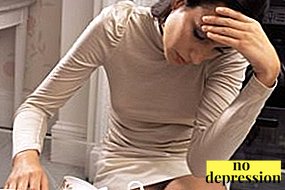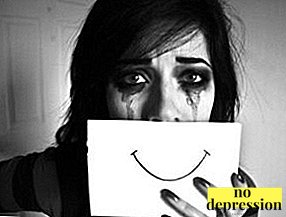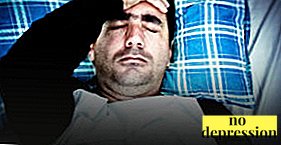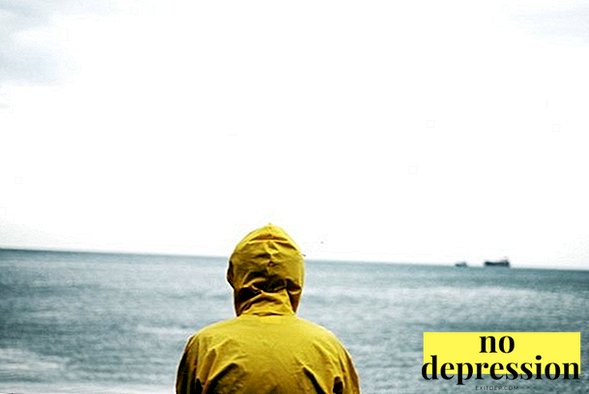Neurotic depression - a type of neurosis, which is characterized by the following symptoms: constant depression, impaired performance, apathy, sleep problems, autonomic disorders.
The disease develops on the background of an acute stressful situation.
Description and characteristics

Neurotic depression, or, in other words, depressive neurosis - A disorder that combines the symptoms inherent in both neurosis and depression.
Wherein depressive symptoms it appears moderately, since the majority of patients maintain a positive outlook on their own future, and there are no personality disorders that develop with prolonged depression.
In some countries, doctors do not consider neurotic depression to be an independent disorder and refer it to situational depression.
What is the difference between neurosis and depression?
How to distinguish depression from neurosis?
Both neurosis and depression have similar symptoms, such as fatigue, disability, various sleep disorders, autonomic symptoms, irritability, depression, and much more. But at the same time, it is impossible to say that neurosis and depression are one and the same.
When depression prevail sense of hopelessness, depression, often reaching extreme points. The patient loses his capacity for work and interest in something, including the fact that he was expensive and important before the onset of the disease.
He does not see the point that surrounds him, often does not understand why he should continue to live, can try to commit suicide from despair.
Also, people with depression tend to hate themselves and believe that those around them also hate and despise at heart.

And if this is for some reason wrong, they find it other irrational explanations (“In fact, she just didn’t recognize me well enough, so she considers me interesting and smart, but then she will understand everything”).
Such irrationality in thinking is one of the foundations of depression, according to cognitive psychology.
If a person suffers from depression, he is partially or completely loses the ability to enjoy and enjoy.
With neurosis, this does not occur. Neurosis manifests itself softer, and irritability, tearfulness, sleep problems, and increased fatigue come to the fore.
But man is all still able to see your future in bright colors, his thinking does not generate irrational, negatively colored statements inherent in depression, he can enjoy the fact that he is dear.
The main engine of neurosis is stressful situations. If a person leaves the zone of stress, the symptoms of neurosis are alleviated or disappear completely, depending on the characteristics of the disease.
With depression, it works poorly or does not work completely, since its main engines are not only outside, but inside the person.
Yes, depression, like neurosis, can trigger and chronic stress and acute stressful situation, but the irrational attitudes inherent in depression do not allow a person to get out of it in the same way as from neurosis, and he does not have the strength to solve the external situation aggravating the disease.

And all the negative things that happen around him only support the irrational attitudes, strengthen them.
It is important to understand that a person considers these installations, on the contrary, rational and usually ready to back them up with arguments, which seems to a person without depression extremely pessimistic and even strange.
These two diseases often accompany each other, and in their background may develop other disorders, such as obsessive-compulsive disorder, anxiety, panic disorder.
Neurosis and depression - how do they fit together? What is the difference between neurosis and depression? Find out from the video:
Classification and forms
The following forms of neurotic depression are distinguished, depending on the causes of the appearance:
- Exogenous, or reactive. The disease develops after experiencing a psycho-traumatic situation: the death of a loved one, a severe episode of violence, a painful break in relations, dismissal, and other causes. For reactive neurotic depression, mood swings are uncharacteristic, and human thoughts are concentrated on what happened.
 Endogenous. Despite the fact that endogenous depression can develop after a traumatic episode or is moderate in severity of a stressful situation, its occurrence is closely related to the personality and genetic characteristics of a person. Also, this form of depression can develop almost from scratch.
Endogenous. Despite the fact that endogenous depression can develop after a traumatic episode or is moderate in severity of a stressful situation, its occurrence is closely related to the personality and genetic characteristics of a person. Also, this form of depression can develop almost from scratch.
Forms of depression, depending on the characteristics of mood swings:
- Bipolar. This form is characterized by radical fluctuations in the patient's condition, from manic (inadequately elevated mood, increased working capacity, loss of sense of time) to depressive (extremely depressed mood, loss of working capacity).
- Monopolar. Abrupt changes in the state inherent in bipolar neurotic depression are absent. The mood of the patient is monotonously depressed, possible slight daily fluctuations.
About the symptoms of neurotic depression and how it differs from other types of depression in this video:
Causes of development
The main causes of depressive neurosis:
 Acute stressful situation. These include the following traumatic events: a break with a friend, close relative or partner, the death of an important person, an episode associated with any kind of violence (physical, mental, sexual).
Acute stressful situation. These include the following traumatic events: a break with a friend, close relative or partner, the death of an important person, an episode associated with any kind of violence (physical, mental, sexual).- Chronic stress and prolonged stressful effect. This group of causes includes problems, stress at work, tense, conflict situation in the family, caring for a bedridden relative, material difficulties, illness of a loved one, the presence of prolonged violent influence from people around them (bullying in an educational institution or in the workplace, beatings and humiliation by parents, partner).
- Personality Features. Two types of people are prone to neurotic depression: those who are used to restraining their emotions, and those who have low self-esteem, make important decisions with difficulty, worry a lot for various reasons, hardly adapt to changes in life.
Symptoms of depressive neurosis
Neurotic depression is accompanied by the following symptoms:
- Depressed mood. For depressive neurosis is characterized by moderate depression, in contrast to the usual depression. Daily mood swings, also characteristic of classical depression, are mild or not observed.
- Inhibition, apathy, fatigue. It becomes more difficult for the patient to think, his speech and movements are slowed down, he needs to take more rest breaks while working.
 Reduction or loss of interest in the usual activities. This symptom is not as pronounced as with classical depression, and may be absent.
Reduction or loss of interest in the usual activities. This symptom is not as pronounced as with classical depression, and may be absent.- Degradation of performance or, conversely, the desire to go to work head off to get away from feelings and feel better, especially if the reason for the development of a depressive neurosis is associated with problems in family relationships.
- Sleep disorders It is difficult for patients to fall asleep, their sleep is shallow, sensitive, they often wake up during sleep and have difficulty falling asleep again. During the day, drowsiness and feeling of weakness may occur.
- Vegetative disorders. Dizziness, drops in blood pressure, malfunctions of the gastrointestinal tract (pain, flatulence, constipation, diarrhea), heart palpitations, loss of appetite, and a feeling of weakness may occur. Most people who experience this symptom go to the hospital, but no serious somatic diseases are detected, and symptomatic treatment does not help get rid of the disorders.
With neurotic depression, suicidal moods and the desire to fence from others are usually absent.
Treatment and Care Techniques
Like most mental disorders, neurotic depression is treated using pharmacological and psychotherapeutic methods.

Medicines assigned to the patient individually and according to his symptoms.
In the course of treatment, drugs can be replaced by others if it turned out that they are not suitable.
Drug therapy - An important aspect of the treatment of depressive neurosis, but not central, since after withdrawal of drugs, symptoms return if psychotherapeutic methods of treatment are not connected.
The following groups of drugs can be prescribed:
- antidepressants. Unlike the other groups of drugs listed below, they are almost always present in the course of treatment. Examples: Tsitalopram, Imipramine;
- atypical antipsychotics (Quetiapine, aripiprazole). Improve mood, reduce the severity of apathy and lethargy;
- sedatives. They have very few side effects, have a positive effect on sleep and mood, reduce nervousness. Examples: Valerian tincture, Novo-Passit;
- nootropics. They reduce inhibition and apathy, increase interest in life, and have a positive effect on concentration. Examples: Piracetam.
Also, if necessary, assigned complexes vitamins and minerals, physiotherapy (massage, electric, darsonvalization, hydrotherapy).
When treating neurotic depression, cognitive-behavioral psychotherapy methods show high efficiency.
Psychotherapist teaches the patient to notice the automatic thoughts associated with his irrational attitudes, and refute them by writing to a special table.

This technique is widespread and allows you to achieve positive results in a fairly short time.
Psychological counseling may also be helpful.
During the conversation, the psychologist discusses the patient’s problems, changes his attitude towards them, shows other aspects of the problems offers working solutions. In some cases, the patient’s close people are invited to a psychological consultation.
Prognosis and prevention
With timely treatment of neurotic depression, the prognosis is positive: in a short time, it is possible to achieve positive results.
If the disease takes too long, to him other disorders may joinwhich aggravate the condition and complicate the treatment process. Also, in the long run, neurotic depression transforms into neurotic personality disorder.
Basic preventive recommendations:
 avoid stressful situations whenever possible;
avoid stressful situations whenever possible;- be in the open air more often;
- Do not keep in the lives of people who adversely affect the mental state.
When the first signs of mental disorders occur, it is important go to the hospital and undergo a complex of examinations, and then, if the tests do not show the presence of physical diseases, come to an appointment with a qualified psychotherapist.
What you need to think about when a neurotic depression occurs? Perhaps this video will help you:

 Endogenous. Despite the fact that endogenous depression can develop after a traumatic episode or is moderate in severity of a stressful situation, its occurrence is closely related to the personality and genetic characteristics of a person. Also, this form of depression can develop almost from scratch.
Endogenous. Despite the fact that endogenous depression can develop after a traumatic episode or is moderate in severity of a stressful situation, its occurrence is closely related to the personality and genetic characteristics of a person. Also, this form of depression can develop almost from scratch. Acute stressful situation. These include the following traumatic events: a break with a friend, close relative or partner, the death of an important person, an episode associated with any kind of violence (physical, mental, sexual).
Acute stressful situation. These include the following traumatic events: a break with a friend, close relative or partner, the death of an important person, an episode associated with any kind of violence (physical, mental, sexual). Reduction or loss of interest in the usual activities. This symptom is not as pronounced as with classical depression, and may be absent.
Reduction or loss of interest in the usual activities. This symptom is not as pronounced as with classical depression, and may be absent. avoid stressful situations whenever possible;
avoid stressful situations whenever possible;

